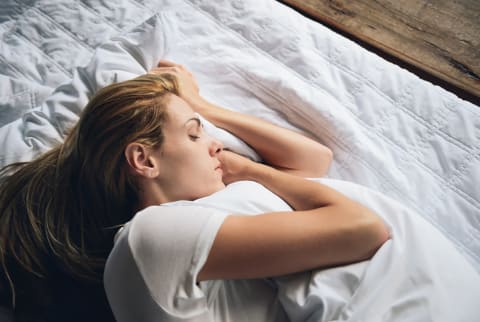Advertisement
Hormone Of Darkness: 4 Facts That You Didn’t Know About Melatonin

Sleep struggles come in all shapes and sizes, and Americans are no stranger to them. In a recent survey, 80% of U.S. adults reported troubles with sleeping at least once a week. Between the midnight tossing and turning and groggy mornings — there are few things more challenging than missing out on the basic human need of sleep.
To support a better night’s rest when they need it most, millions of people have turned to melatonin supplements.* Because why settle for those midnight hours staring at the ceiling when you can have the support of a supplement, like vitafusion™ Melatonin Max Strength Gummy Vitamins?* But considering the popularity of melatonin, few of us know what it really is or why it works. So let’s dive in deeper and explore the lesser known facts about melatonin!
Melatonin is activated by darkness
Deep in the brain of every mammal sits the pinecone-shaped pineal gland — a part of our anatomy which has fascinated scientists and spiritualists alike. In response to darkness, the pineal gland produces and secretes its main hormone product that we now know well as melatonin1. Because of this function, melatonin is also known as the hormone of darkness. Melatonin is a hormone that occurs naturally in the body, but we can also supplement it. vitafusion™ Melatonin Max Strength Gummy Vitamins are specially formulated to provide 10 mg of melatonin per serving to support our beauty sleep.*
Its sleep benefits were discovered on accident
We didn’t always know melatonin was supportive of sleep.* Melatonin was discovered first in research1 that revealed bovine pineal tissue extracts could help alter the melanin levels in frogs. (Random much?) Melanin2 is a natural pigment responsible for skin color, and is actually the source of the word melatonin. Throughout this process, researchers were able to witness the sleep-promoting effects of melatonin.*
Melatonin works with our sleep/wake cycles
To better understand how melatonin supports sleep, we turn to our circadian rhythms.* According to the CDC, circadian rhythms are “internally driven cycles that rise and fall during the 24-hour day.”3 This 24-hour cycle is also referred to as our circadian clock, which resets every 24 hours by the sun’s cycle of light and dark. Darkness signals the pineal gland to produce melatonin, while lightness turns it off, so to speak. This function is why vitafusion™ Melatonin Max Strength Gummy Vitamins can help regulate our sleep-wake cycle.* (And why you’d consider making it a part of your bedtime routine, particularly when your circadian rhythm has been challenged.)*
The connection between jet lag and melatonin
Because of melatonin’s key role in our circadian clock, many people supplement melatonin to help deal with jet lag.* As you may know, jet lag is the experience that results from galavanting across several multiple zones. As we arrive halfway across the world, our inner clock reads one thing — and the local clock reads another. Using melatonin to help with jet lag might look like taking two vitafusion™ Melatonin Max Strength Gummy Vitamins when it gets dark and is time for bed.* Even though your body might be craving breakfast, we have to set the tone for sleep!
Melatonin as a part of your bedtime routine
As we absorb this deeper understanding of what melatonin is, and how it functions, it’s clear to see its relationship to sleep. And to optimize that relationship, we can make it a part of our bedtime routine. Generally speaking, making the most out of a bedtime routine is one of the simplest ways to take action against those stubborn sleep woes.
Instead of jumping right from scrolling your social feeds to hitting your pillow — give yourself a full half hour or more to wind down. Carving out space to get in the mindset of sleep can make all the difference. Take a hot shower. Diffuse lavender essential oil in your bedroom. Enjoy the strawberry flavors of your vitafusion™ Melatonin Max Strength Gummy Vitamins, and do a little light reading (not on your phone) until your eyelids grow heavy. However you design your ritual, know one thing: it’s key to all the sweet dreams and good mornings.*
*These statements have not been evaluated by the Food and Drug Administration. This product is not intended to diagnose, treat, cure, or prevent any disease.
